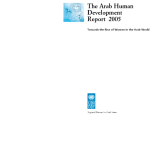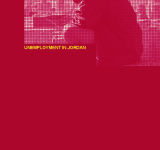This report presents a compelling argument as to why realising the full potential of Arab women is an indispensable prerequisite for development in all Arab states. It argues persuasively that the long hoped-for Arab “renaissance” cannot and will not be accomplished unless the obstacles preventing women from enjoying their human rights and contributing more fully to development are eliminated and replaced with greater access to the “tools” of development;; including education and healthcare. By placing Arab women firmly in the centre of social;; cultural;; economic and political development in the entire region;; the Report goes beyond arguing that half the population deserves half the participation. In fact;; it asserts that irrespective of the numbers;; Arab women have already accomplished great strides that are transforming the region’s political economy and social demography. While lauding these achievements and making a strong case for facilitating this strong current of positive social transformation;; the Report also analyses the remaining impediments;; and suggests concrete steps towards their elimination.

